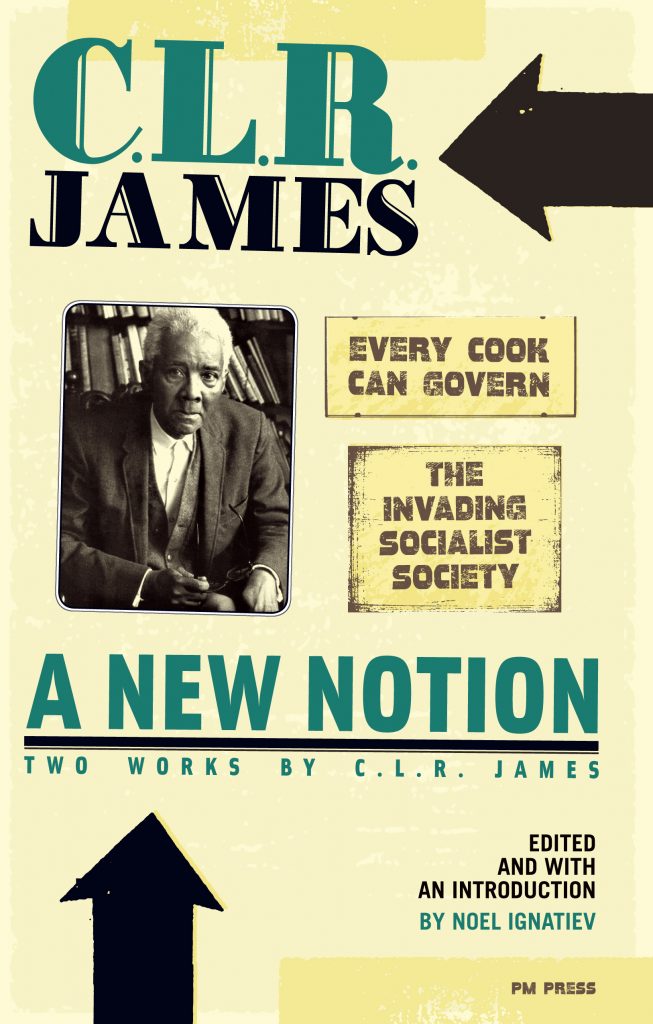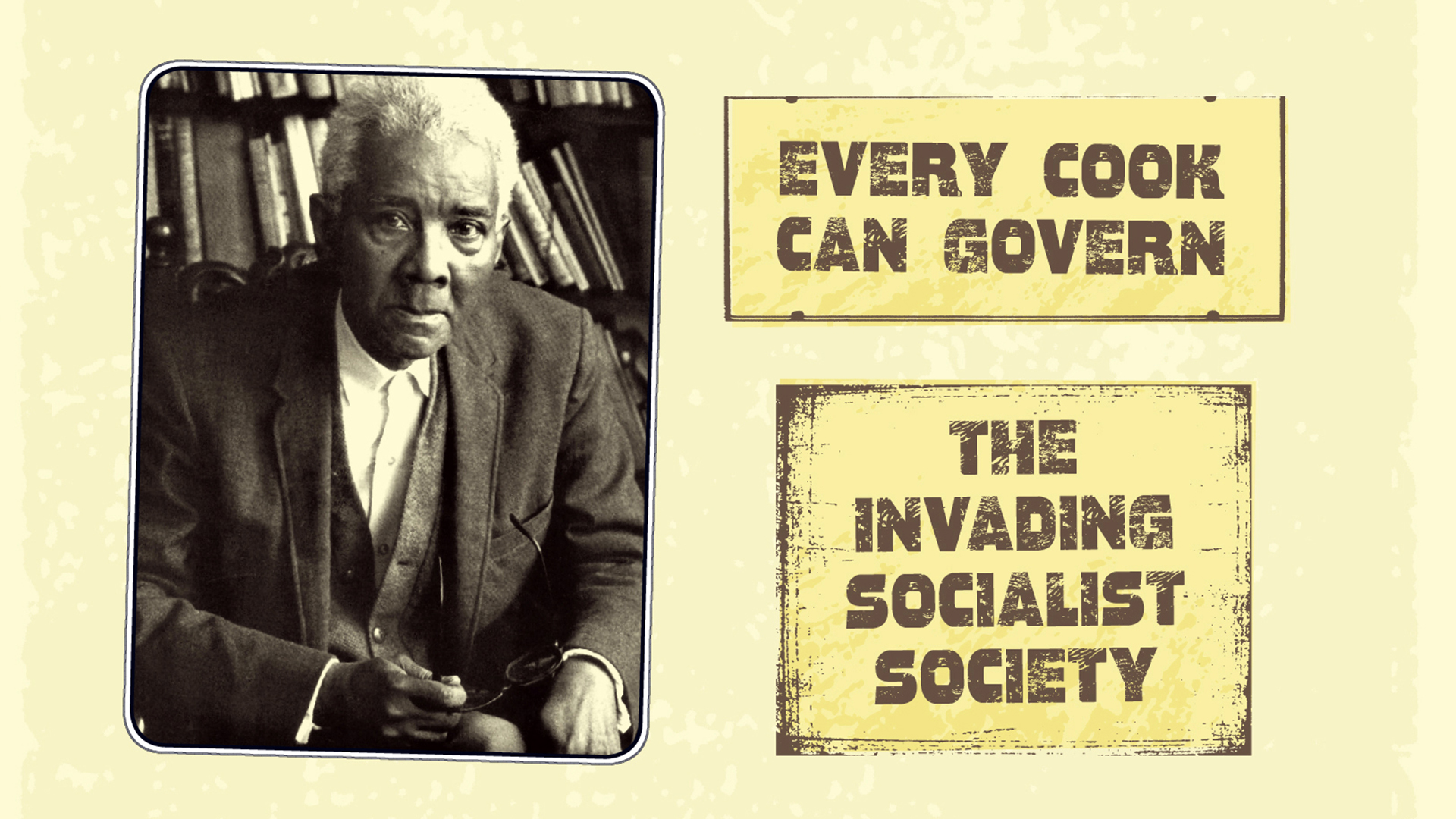
By Paul Whiteley
Alternate Routes
Born in Trinidad, living most of his life in the United States and in England, and an influence to Marxist and post-colonial theorists alike, C.L.R. James (1901-1981) remains one of the most inspirational activist scholars of the 20th century. And also one of the least frequently read. Noel Ignatiev has brought together as A New Notion two of James’s postwar pieces written while he was active on the American left. “The Invading Socialist Society” (1947) is titled after a felicitous phrase of Frie- derich Engels’ Socialism: Utopian and Scientific, and is orientated above all to workers’ struggle towards socialism. “Any Cook Can Govern” (1956) takes its inspiration and title from Lenin, and originated as a pamphlet written after James was driven out of the United States by McCarthy-era persecution and state militancy.
Grateful as one may be to see these pieces in print, there are issues to be raised with aspects of this publication. “The Invading Socialist Society”, by far the longer text, is credited to James and Raya Dunayevs- kaya. But Grace Lee Boggs, the third principal of the Johnson-Forest tendency (the Marxist-humanist splinter the text represents) is not listed even though her name (or pseudonym) was included as an author in a variety of previous editions. What is more, Noel Ignatiev’s introduction presents both pieces only in the context of James’s life and trajectory, which removes “The Invading Socialist Society” from the dynamic and collaborative environment of the tendency in which it was produced. Even the picture on the book’s cover represents the author more as aging inspiration to postcolonial cultural studies, rather than the much younger writer of these political pieces.
Granted, this slim paperback is not intended as a definitive scholarly publication, but Ignatiev’s edition could have served its audience better by providing some additional background. Contemporary readers of “The Invading Socialist Society” may not be aware of Max Shachtman – the leader of the U.S. “Workers Party” who developed the interpre- tation of the Soviet Union as a “bureaucratic collectivist” society – or that “Germain” was the early pen name for Marxist economist Ernest Mandel. In 1946 Mandel was made the youngest member of the secre- tariat of the “Fourth International” and, as an orthodox Trotskyite, he defended the conception of the Soviet Union as a “degenerate worker’s state.” Presenting the competing “state capitalist” interpretation, James, Boggs, and Dunayevskaya critique both Mandel’s bias to defend of the USSR, in spite of its shortcomings, and Shachtman’s tendency to endorse bourgeois democracy based on his conviction that the Soviet Union is the “greater evil.”
Encountering these texts, the reader should not expect C.L.R. James as the ruminating commentator of Beyond a Boundary or the energetic historian of Black Jacobins. A New Notion presents James as polemicist, pamphleteer and above all as one believing centrally in the power of revolutionary workers:
With the world socialist revolution the history of humanity will begin. And that is precisely what is already shaking the world. Vast mil- lions of men are not thinking or acting as in the old days. They are flexing themselves for a leap that has become imperative for them – the leap from the realm of capitalist necessity into the realm of social freedom. This today is revolutionary politics (p. 36).
James, Boggs, and Dunayevskaya believed in the 1940s and 50s that workers, rather than being pawns of the capitalist system or dupes of party or trade union bureaucrats, were already engaged in the historical process of shedding their chains, equally engaged against American or Soviet imperialism. They saw the potential of American blue- and white-collar workers alongside those in the Soviet bloc and in colonial or post-colonial settings; a striking aspect of the Johnson-Forest tendency was its active engagement in issues of race and gender (they were also interested in decolonization, a theme which sits at the margins of TISS). In spite of the extensive references to Lenin and Trotsky, the reader will find their situational analyses cited in such a way as to undermine the conception of the “Vanguard party” – in one striking passage, they assert that the Fourth International “is far too much governed by the false idea of Lenin in What is to be Done that the party brings socialist consciousness to the masses from the outside” (p. 101). This willingness to critique not only the monstrosity of the Stalinist experiment but also the limitations of Lenin’s and Trotsky’s analysis, shows the crucial role of the Johnson- Forest tendency in opening up alternative paths for Marxist analysis and action in the mid-20th century.
Meanwhile, “Every Cook Can Govern” is a pamphlet which rep- resents aspects of an important turn in James’s thought. In addressing the example of Athenian democracy, he contends that direct democracy in ancient Greece was instituted on the basis of popular organizing, maintained by careful institutional measures, and depended less on the institution of slavery and more on a robust, egalitarian conception of citizenship. For James, this example demonstrates that the possibility of self-management for ordinary working people – this ties together his interest in grassroots organization on the shop floor with imma- nent developments in the ex-colonies under a robust understanding of democracy.
From a 21st century standpoint, it may seem obvious that the Soviet Union of the 1940s was an imperialist power, and that the alienation of workers and oppression of nationalities in Eastern Europe could equal their equivalents under Western capitalism. However, the Johnson- Forest tendency continues to inspire analyses of state capitalism. It rec- ognized the importance of gendered and racialized struggles, valorized the creative power of labour, and celebrated the capacities of workers for self-determination and self-management. In spite of the limitations of A New Notion as a publication, its release must still be welcomed as a con- tribution to the continuing presentation of activist theory, in particular that of C.L.R. James, to new generations.
1 Paul Whiteley is a PhD candidate at the Department of Geography, Queen’s University. He completed his Master’s in Political Economy at Carleton University, exploring the connec- tions between Harold Innis and contemporary post-humanist approaches.
Back to C.L.R. James’ Author Page | Back to Noel Ignatiev’s Author Page






